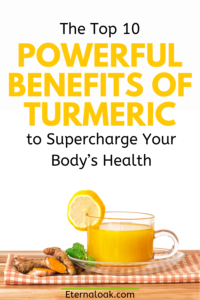Looking for a cheap spice to supercharge your health without breaking the bank?
Look no further than turmeric. In this mini-article we’ll cover 10 awesome health benefits that turmeric has to offer.
This is a snippet from the original post, boasting 30 health benefits of turmeric, here.

1. Medicinal properties
The powerful chemical that gives this plant its yellowish color, curcumin, has promising medicinal properties. Such illnesses it can treat are, but not limited to, digestive issues, ulcers, IBS, liver problems and much more. According to one study, Curcuma longa (the plant’s scientific name) was found to have antioxidant properties and the ability to eliminate porcine pancreas derived lipase (1).
Another study found that a powerful chemical in the plant, curcumin, is a keto-enol moiety with promising electrostatic potential. This means it has strong therapeutic value to treat a number of diseases.(2).
2. Increases The Body’s Antioxidant Capacity
Oxidation is a double-edged sword. It’s the body’s way of eradicating dangerous free radicals. On the other pole, oxidative stress is one of the leading causes of life-threatening illnesses, such as cancer. As seen in the porcine lipase study above, turmeric’s antioxidant capacity shows its potential for therapeutic use.
Furthermore, it earns praise after findings in a study on the effects of nutraceuticals on cardiovascular health (3).
According to the study, cardiovascular diseases are the leading cause of morbidity and mortality. Along with other plants researched, it was found to reduce CVD risk factors because of its anti-oxidant and anti-inflammatory properties.
3. Helps Prevents Various Forms Of Cancer
Studies have proven curcumin’s effectiveness when it comes to types of cancer. According to one NIH study, curcumin has inhibitory effects on certain viruses and carcinomas (4). It can inhibit head and neck squamous cell carcinoma (HNSCC) and foster apoptosis in HPV cells.
Another study found that chemicals in the South Asian spice, due to their anti-inflammatory properties, can reduce cancer and other diseases (5). This is because inflammation plays a role in cancer developing.
These findings bring hope to those suffering from the ineffectiveness, high cost and negative side effects of pharmaceuticals.
4. Helps Prevent Alzheimer’s
Alzheimer’s disease is characterized by degenerating brain function. Symptoms may begin with memory loss. Gradually, all functions governed by the brain begin to shut down. According to WebMD, the number of Alzheimer’s cases is expected to triple to 14 million by the year 2060 (6).
No pharmaceutical treatment is capable of slowing or reversing the illness; there are only drugs that minimize the symptoms. Therefore, many professionals are turning to natural alternatives. Authors Tang and Taghibiglou concluded that curcumin is more efficacious at treating Alzheimer’s than current pharmaceutical treatments (7).
A separate study found that preclinical and in vitro studies support the potential of curcuminoids in treating the disease (8).
For a more in-depth look at how to use turmeric to help with Alzheimer’s, check out this article.
5. Eases Arthritis Symptoms
The inflammation of the joints, also known as arthritis, is one of the most common illnesses that develop with age. Symptoms include immobility, pain, stiffness and swelling.
An NIH study observed the ability of chemicals in the curcuma zedoaria roscoe (zedoary) plant to fight inflammation. The plant is in the curcuma family and thus contains curcumin. It was found that the polyphenol can inhibit pre-inflammatory protein expression (9).
A separate study found the chemical to be effective against diseases associated with aging, such as Alzheimer’s (10).

6. Treats Depression
The term depression is thrown around like it’s an everyday thing and warrants no real concern. However, if you’ve ever experienced real depression, it’s nothing to overlook. It has a way of affecting every aspect of your life. In so many cases, things slowly fall apart.
Currently there are a plethora of drugs formulated for depression. However, they are accompanied by their own side-effects. Some include daytime sleepiness, insomnia, weight gain, impotence and suicidal tendencies. Studies have found curcumin to be a possible treatment for depression.
A study was conducted involving 377 patients who were treated with both curcumin and placebo (11). Significant anti-depression and anti-anxiety effects resulted from treatment with curcumin. To add, no adverse side-effects were noted.
7. Delays The Aging Process
Aging is thought to be an inescapable process. Furthermore, we generally associate getting old with feeling worse. However, aging occurs as an effect to one’s lifestyle and environment. It’s a common observation that our diets play a large role in how fast we age and mortality.
Furthermore, getting old comes with more medications. However, these medications come with so many side-effects that they have a huge impact on how we age. AARP lists some drugs that older adults should use with caution because of their side-effects (12).
For instance, muscle relaxers can lead to confusion and higher rate of falls and injuries. NSAIDS can cause ulcers, digestive bleeding, high blood pressure and more. The list goes on.
The good thing about curcumin is that studies have found it to be effective at preventing age related diseases (13). Side-effects are virtually non-existent.
8. Powerful Anti-Inflammatory
As mentioned above, curcumin fights inflammation. Although inflammation is the body’s way of protecting itself, it’s also the cause for illnesses. An NCBI article explains that inflammation is an immune system response, and chemicals like histamines are produced as a result (14). They widen the blood vessels to send more blood to heal affected areas.
Additionally, inflammation is associated with more mucus, which helps the body flush out unwanted toxins and pathogens. However, inflammation causes pain and even causes the body to attack its own cells. It can also give rise to cancer and cardiovascular diseases. Curcumin has been found to prevent and suppress inflammation in the body (15).
9. Improves Brain Function
Turmeric’s polyphenolic-hydrophobic constituents are therapeutic without having toxic effects. They can be used to effectively treat brain disorders, as shown in one study (16). Another study observed turmeric’s function as an anticonvulsive medication (17). It was found to both inhibit and reverse convulsive behavior in test subjects. This feature provides a safe alternative for those suffering from seizures.
As mentioned earlier, it’s also beneficial for depression and Alzheimer’s, which are both results of brain dysfunction.
10. Decreases Chances Of Heart Disease
Based on CDC facts, heart disease is the cause of one in four deaths and is the leading cause of death (18). Curcumin has been shown to prevent heart failure, according to one study (19). The study found one form of curcumin, theracumin, to be more bioavailable than in its natural state. This offers a natural alternative with virtually no side-effects.
Another study found it to be highly effective at protecting against cardiovascular related diseases, such as high blood pressure, stroke and atherosclerosis (20).
If you’ve experienced any of the illnesses above with minimal relief, then it’s worth giving this natural alternative a try. Turmeric (turmeric) just might be the panacea for a number of common ailments. Studies show it to be effective in treating and preventing numerous diseases. It has been proven to be worth its weight in gold.
Sources
1 – https://www.ncbi.nlm.nih.gov/pubmed/30026782
2 – https://www.ncbi.nlm.nih.gov/pubmed/29934731
3 – https://www.ncbi.nlm.nih.gov/pubmed/30109827
4 – https://www.ncbi.nlm.nih.gov/pubmed/30333956
5 – https://www.ncbi.nlm.nih.gov/pubmed/30319623
6 – https://www.cdc.gov/aging/aginginfo/alzheimers.htm
7 – https://www.ncbi.nlm.nih.gov/pubmed/28527218
8 – https://www.ncbi.nlm.nih.gov/pubmed/30318014
9 – https://www.ncbi.nlm.nih.gov/pubmed/30267971
10 – https://www.ncbi.nlm.nih.gov/pubmed/29621160
11 – https://www.ncbi.nlm.nih.gov/pubmed/28236605
13 – https://www.ncbi.nlm.nih.gov/pubmed/29621160
14 – https://www.ncbi.nlm.nih.gov/pubmedhealth/PMH0072482/
15 – https://www.ncbi.nlm.nih.gov/pubmed/30319623
16 – https://www.ncbi.nlm.nih.gov/pubmed/30317632
17 – https://www.ncbi.nlm.nih.gov/pubmed/30243647
18 – https://www.cdc.gov/heartdisease/facts.htm